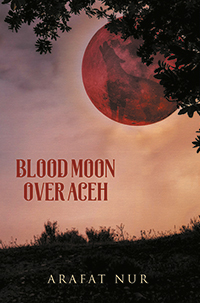Reviews
Zubaidah Djohar, Poet and Social-Political Researcher on Aceh:
In Blood Moon over Aceh, Nur records crimes against humanity during the military operations in Aceh 1976–2005. The novel reveals the author’s deep understanding of the impact of a conflict, its background, and settlement. This translation renders the author’s lines of pain experienced by innocent people, as well as the melancholy that oozes from this gaping wound.
==================
Jacqueline Siapno, Author of Gender, Islam, Nationalism and the State in Aceh: The Paradox of Power, Co-optation, and Resistance (Routledge Curzon 2002). Co-founder of: International Forum for Aceh with the late Jafar Siddiq Hamzah from Lhokseumawe. Field researcher for the report: “Shock Therapy: Restoring Order in Aceh, 1989–1993.” (Amnesty International 1993) :
Alue Rambe, a rural village in Aceh, at the epicenter of one of the world’s richest oil and gas fields, is the setting of Blood Moon over Aceh. This elegant, nuanced translation of a beautifully written, insightful, powerful novel on a horrific topic reflects on the lives of Acehnese who have been silenced.
Nur writes about the loneliness, isolation, and grief. His work gives voice to the untold stories of kidnappings, normalized terror, and military atrocities designed to shock civilians into silenced fear. Breaking through a historical amnesia, Nur’s work joins a growing chorus of poets, historians, filmmakers, scholars, and global environmental rights lawyers producing new knowledge about the same phenomena from different angles, all calling for justice.
Blood Moon over Aceh shows what happens when private greed and multinational corporations go unchecked and work with public institutions in the Indonesian state and military to create public policies that destroy the environment and the lives of ordinary citizens.
==================
Eka Srimulyani, Professor of Sociology, Ar-Raniry Islamic State University, Banda Aceh, Indonesia :
The novel’s historical backdrop is the armed conflict between the Gerakan Aceh Merdeka (Free Aceh Movement) and Tentara Nasional Indonesia (Indonesian National Armed Forces) 1976–2005. Nazir is the son of a farmer who was appointed district supervisor of the rebellion. The meticulous rendition of characters, place, and scene confirm Nur’s familiarity with his subject. The work is an elegant combination of historical details and a disturbing, personal story of the inhumanity the Acehnese endured.
This translation has accurately maintained the author’s fluid language and has captured the novel’s intrinsic value. Hopefully, this work will inspire the rise of even more voices that collectively bring forth an awareness of the high price of peace.
==================





